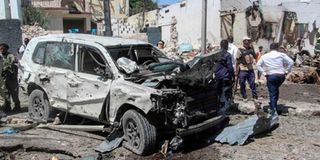Tired civilians forcing change on counter-terrorism policies

A general view of the scene of a car-bomb explosion in Mogadishu on January 12, 2022 where at least six people were killed and several others wounded in the huge blast that caused devastation in the area along the 21st October road.
Somalia and Sri Lanka may be thousands of kilometres apart. But civilians in both countries have lately become more involved in counter-terrorism measures.
In Somalia, civilian vigilantes have been volunteering to fight alongside their national forces, pushing an unprecedented series of victories against al-Shabaab militants.
The phenomenon has since been endorsed by President Hassan Sheikh Mohamud.
In Sri Lanka, the Pakistani High Commission in Colombo on Saturday received unusual guests: local protesters seeking assurances that Pakistan will do more to lessen the burden of terrorism in the Asian region.
According to the local newspaper Daily Mirror, protesters led by a local opposition party the New Democratic People’s Front, held a protest outside the High Commission of Pakistan, part of events to remember victims of 26/11 Mumbai attack but after which they handed in a petition asking Islamabad to take steps to end terrorism.
Its weak policy, the protesters argued, had become “a threat not only to South Asia but the entire world,” local media reported, citing the party’s General Secretary VG Yoharajan Pillayi.
This week marks 14 years since the Mumbai attacks in India. A Pakistani terror group known as the Lashkar-e-Taiba (LeT) killed 166 people, including 18 security forces, and injured several others in a three-day in the Indian capital.
Pakistan and Somalia may be divergent countries, the latter having struggled for years to rise from ashes of civil war, and now battling against al-Shabaab. The former, a relatively richer economy, has struggled with militant groups roaming across its borders, and profiting from unstable Afghanistan, in the neighbourhood.
The Tehrik-i-Taliban Pakistan (TTP) group, for example has operated near the border between Pakistan and Afghanistan.
After the Taliban took power in Afghanistan last year, the TTP reached a peace deal with Pakistan in May. But the group remains active.
On Saturday, at a joint press stakeout with Türkish President Recep Tayyip Erdogan, Pakistani PM Shehbaz Sharif called for joint efforts to wipe out terrorism.
“The people of Pakistan have paid a very heavy price in trying to defeat terrorism,” he said in Turkey, according to a short video posted on his Twitter page.
“We would like to join hands in fighting terrorism of all shades and colour and wipe them up from the face of not only Turkey and Pakistan, but from the face of earth.”
Last week, Turkey said it had arrested a female ringleader and several other suspects said to have masterminded a bomb in Istanbul.
Domestically, however, Pakistan still struggles. Last week, six policemen were killed in an attack by TTP, in Khyber Pakhtunkhwa, according to the Dawn newspaper.
And the PM, at the time, admitted, terrorism remains one of Pakistan's foremost problems,
The country had forged closer ties with Taliban in Afghanistan, but faces a terror group that is locally called the Pakistan Taliban.
“Let us make no mistake. Terrorism continues to be one of Pakistan's foremost problems. Our armed forces & police have valiantly fought the scourge. No words are enough to condemn terrorists' attack on a police van in Lakki Marwat. My thoughts and prayers are with bereaved families," Sharif tweeted, referring to the location of the attack.
While officials promise collaboration, the lessons from Somalia and Sri Lanka, civilians will be needed to provide pressure for authorities to act tougher on terrorism.





